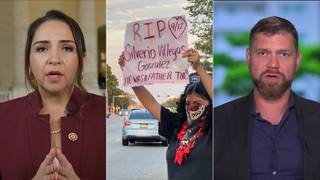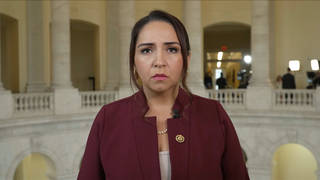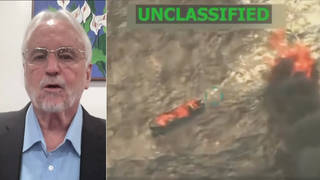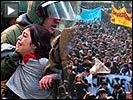
Guests
- Francisco "Papas Fritas" Tapiaartist and activist in Chile who burned $500 million worth of student debt papers from the Universidad del Mar.
You may know the adventures of Robin Hood and Zorro, outlaws fighting for the poor. Today we meet the newest member of that club, a Chilean activist who goes by the name Papas Fritas. Francisco Tapia, known as Francisco “Papas Fritas,” or French fries, says he burned $500 million worth of debt papers from the private Universidad del Mar. Chilean authorities are in the process of shutting down the university over financial irregularities. But that has not stopped the school from collecting on its student loans. During a recent student takeover of the school, Papas Fritas says he took the debt paper records, burned them and displayed the ashes inside a van as an art exhibition. “It is a concrete fact that the papers were burned. They are gone, burned completely, and there’s no debt,” said Papas Fritas in his first U.S. broadcast interview. “Since these papers don’t exist anymore, there’s no way to charge the students.”
Transcript
JUAN GONZÁLEZ: In a Democracy Now! exclusive, we turn now to Chile, where an artist’s act of protest against student debt has gone viral. Francisco Tapia, known as Francisco “Papas Fritas,” or “French fries,” says he burned $500 million worth of debt papers from the private Universidad del Mar, the University of the Sea. Chilean authorities are in the process of shutting down the university over financial irregularities.
AMY GOODMAN: But that hasn’t stopped the school from collecting on its student loans. During a student takeover of the school, Papas Fritas took the papers, burned them, displayed the ashes inside a van as an art exhibition. He released a video describing what he called an act of love.
FRANCISCO ”PAPAS FRITAS” TAPIA: [translated] It’s over. You are free from debt. You don’t have to pay one more cent. This is the artwork. This is the project, simply. This is a small project. If we all had the ability to continue doing things for love, for solidarity, we will find each other again. But we have to lose the fear, the fear of the idea about criminality that this state has wanted to impose on us, that we are criminals for being poor, for wanting our rights to be met.
JUAN GONZÁLEZ: The video has received over 120,000 hits on YouTube since it was posted last week. It comes as Chile faces renewed protests over its education system. On Wednesday in Valparaíso, authorities fired tear gas and water cannons on thousands of students demanding free education for all. President Michelle Bachelet has vowed to reform the system, but the students say her plan doesn’t go far enough.
AMY GOODMAN: Following efforts to privatize education under the dictatorship of Augusto Pinochet, the cost of higher education in Chile is among the highest in the world.
Well, we interviewed Papas Fritas on Wednesday in his first U.S. broadcast interview. I began by asking him to describe what he did with the student debt documents.
FRANCISCO ”PAPAS FRITAS” TAPIA: [translated] The Universidad del Mar was occupied. It was one of the longest occupations that has occurred in Chile. This was the main building on campus. I went looking for the keys. I went to share them, to see if we could figure out a system for them to be able to continue to occupy the building for more than a year. I contributed as much as I could. But I went with the specific goal of finding those debt papers. I knew that Chilean authorities, through the judicial system, would eventually use the documents to continue to charge students for that money.
I told this to the students, that because of my trajectory as an artist in Chile, I explained that I was going to make an exhibition about the problems that the students face and that I was going to collect objects from the university. But the debt papers, or IOUs, were not considered among these objects. And so I rescued them, taking away all the promissory notes and those documents.
I secretly took them to the back with other things that were not valuable, but for me they could be used to make a montage, a work of art. And they even helped me to take those things out, after being there for nearly two months in different stages. I brought them to Santiago and then began to burn these documents, little by little, in different places.
JUAN GONZÁLEZ: Let me ask you: Were there no digital backups of records, electronic records, of these loans?
FRANCISCO ”PAPAS FRITAS” TAPIA: [translated] No, the way it works here in Chile is that the creditor of the university are the ones who have to take care to keep these debt papers, not the banks. There is always a digital backup. For example, if you get me a copy of a dollar bill, I cannot use it to go shopping; I have to have the original bill. Nobody knows what happened to these copies. There are two theories, that either the Chilean investigative police affected the backup servers where these debt papers were kept, or they contributed to hiding and removing them, thinking that the rectors of the university—that is, the creditors—or the owners of the university would be able to recover the original ones and get away with it, in case the digital backups were demanded by the prosecution. These are the two theories, and that’s why there is no digital backup today. Now, it is a concrete fact that the papers were burned. They are gone, burned completely, and there’s no debt. Since these papers don’t exist anymore, there’s no way to charge the students.
AMY GOODMAN: On Wednesday, student protesters used the van that you used to display the ashes of the debt papers during a protest in Valparaíso. News footage showed a driver ramming the van into the barricades around the National Congress. What’s your reaction to seeing this use of your artwork, Papas Fritas?
FRANCISCO ”PAPAS FRITAS” TAPIA: [translated] Well, I’m not a moral judge about what the students want to do, nor will I judge their creativity regarding what I donated to them, this object, this artistic work, so they could keep using, because the idea was to always to do a project, an artwork that belonged to the students and as a victory for the students and social movements. It’s not about putting myself in a position of heroism or to be a martyr. Rather, it’s about extending this action.
Thanks to a lot of people in this country that have fought against constant dictatorship, people who have been killed by the military dictatorship, as well as by the dictatorship that we call democracy today here in Chile, and people who have been tortured in various ways, thanks to all those people and youth who have taken to the streets, that this work could be completed. This work is a joint effort. It’s a thing that happens in communities facing the same social problems. And it’s by understanding that erotic rush that we are able to feel empathy, a compassion, because of the problems we face as human beings.
So what will be happening to the van is not something that affects an individual or an event that is something personal. It’s part of the decisions that they want to take. And in that sense, the only thing I can say is that I support and applaud what they did yesterday. It’s their decision. I completely agree they can use the van however they want.
JUAN GONZÁLEZ: I wanted to ask you if there’s been any criminal charges lodged against you and whether you fear being arrested because of your acts?
FRANCISCO ”PAPAS FRITAS” TAPIA: [translated] Look, I approached the authorities in the first place. I collaborated with the justice system. They don’t have a plan to bring criminal charges against me. It is not enough that I declared to them that “I am guilty, and I did things like this.” In the declaration I made, I clearly explained the process of burning the documents.
But the prosecutors in charge of my case have to find evidence. If they find evidence, there are two possibilities for charging me: simple theft or forced burglary, which is breaking and entering. In this case, even if it’s a private university, it was occupied, so it’s no longer breaking in. I would have had to have broken the door by kicking it, and perhaps having intimidated the people, and that was not the case.
Then, the most serious thing I am facing will be a very small sentence that has two mitigating factors, which are that I have a faultless conduct beyond reproach and that I am collaborating with the justice system on how to fix this problem technically. So I might simply be let free with the condition of not stealing not even a piece of chewing gum.
AMY GOODMAN: That’s Chilean artist Francisco Tapia, known as Francisco “Papas Fritas,” or “French fries.” He says he burned $500 million worth of debt papers from the private University of the Sea, Universidad del Mar, and describes it as an act of love. Special thanks to our Democracy Now! in Spanish team, Democracy Now! en Español, for their help with this interview, including Clara Ibarra, Glenda Rosado, Linda Artola, Igor Moreno and Andrés Conteris. This is Democracy Now! We’ll be back in a minute.











Media Options